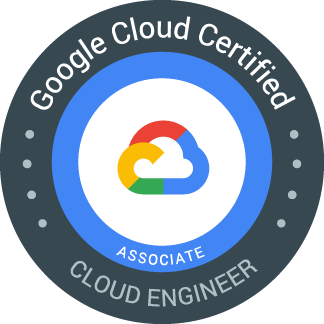GCE

| Formats: | Asynchronous |
| Blended | |
| Online | |
| Onsite | |
| Part-time | |
| Level: | Intermediate |
| Prerequisistes: | |
| Recommended Knowledge | |
| Cloud Computing Fundamentals | |
| Networking Concepts | |
| Linux/Unix Fundamentals | |
| Google Cloud Fundamentals: Core Infrastructure | |
Formats: We offer our training content in a flexible format to suit your needs. Contact Us if you wish to know if we can accommodate your unique requirements.
Level: We are happy to customise course content to suit your skill level and learning goals. Contact us for a customised learning path.
Architecting with Google Compute Engine GCE
This course provides attendees with the knowledge and skills necessary to effectively architect and deploy applications on Google Compute Engine (GCE). You'll learn how to leverage GCE's capabilities to build scalable, reliable, and cost-effective cloud solutions. This course covers key aspects of GCE, including virtual machines, networking, storage, security, and automation.
Overview
This course dives deep into Google Compute Engine, providing hands-on experience in designing, deploying, and managing virtual machines and related resources. You'll explore networking, storage options, security best practices, and automation tools to build robust applications on GCE.
Intended Audience
This course is ideal for:
- Cloud Architects
- System Administrators
- DevOps Engineers
- IT Professionals responsible for managing infrastructure on GCP
- Developers who want to understand GCE architecture
Benefits of Attending
- Master GCE Architecture: Gain a deep understanding of Google Compute Engine and its core components.
- Build Scalable Solutions: Learn to design and implement scalable and resilient applications on GCE.
- Optimize Costs: Understand GCE pricing models and learn how to optimize costs.
- Enhance Security: Implement security best practices to protect your GCE deployments.
- Automate Infrastructure: Learn to automate infrastructure deployments using tools like Deployment Manager and Terraform.
- Improve Operational Efficiency: Gain skills in monitoring and managing GCE resources for optimal performance.
Prerequisites
While there are no formal prerequisites, a basic understanding of the following will be beneficial:
- Cloud Computing Fundamentals: Basic concepts of cloud computing, such as IaaS, PaaS, SaaS, and cloud deployment models.
- Networking Concepts: Familiarity with networking fundamentals, including IP addressing, subnetting, and basic networking protocols.
- Linux/Unix Fundamentals (Optional): Basic knowledge of Linux/Unix operating systems will be helpful but not required.
What You Will Be Able to Do After Attending
Upon successful completion of this course, attendees will be able to:
- Deploy and manage virtual machines on Google Compute Engine.
- Configure and manage virtual machine instances, including CPU, memory, and storage options.
- Design and implement secure and scalable network architectures using VPC.
- Leverage Cloud IAM to control access to Google Cloud resources.
- Select and implement appropriate storage solutions for different use cases.
- Monitor and troubleshoot GCE resources using Stackdriver.
- Implement load balancing and autoscaling for applications.
- Automate infrastructure deployments using tools like Deployment Manager or Terraform.
- Understand and utilize Google Cloud's managed services.
Course Outline
- Module 1: Introduction to GCP
- Introduction to Google Cloud Platform (GCP)
- Interacting with GCP: Console, gcloud CLI, and APIs
- Creating Cloud Storage buckets
- Deploying solutions using GCP Marketplace
- Module 2: Virtual Networks
- GCP VPC Objects: Regions, Zones, Networks, Subnets
- Types of VPC Networks: Default, Auto, Custom
- Implementing VPC Networks and Firewall Rules
- Designing a Maintenance Server
- Module 3: Virtual Machines
- CPU and Memory Options for Virtual Machines
- Disk Options for Virtual Machines: Persistent Disks, Local SSDs
- VM Pricing and Discounts
- Creating and Customizing VM Instances
- Module 4: Cloud IAM
- Cloud IAM Resource Hierarchy
- Types of IAM Roles: Predefined Roles, Custom Roles
- Types of IAM Members: Users, Service Accounts, Groups
- Implementing Access Control for Resources
- Module 5: Storage and Database Services
- Differentiating between Cloud Storage, Cloud SQL, Cloud Spanner, Cloud Firestore, and Cloud Bigtable
- Selecting the appropriate data storage service based on requirements
- Implementing data storage services
- Module 6: Resource Management
- Cloud Resource Manager Hierarchy: Folders, Projects, Organizations
- Understanding and managing quotas
- Organizing resources using labels
- Budget alerts in GCP
- Analyzing billing data with BigQuery
- Module 7: Resource Monitoring
- Stackdriver Services: Monitoring, Logging, Error Reporting, Tracing, Debugging
- Creating charts, alerts, and uptime checks with Stackdriver Monitoring
- Using Stackdriver Debugger to identify and fix errors
- Module 8: Interconnecting Networks
- GCP Interconnect and Peering Services: Dedicated Interconnect, Partner Interconnect, Cloud VPN
- Selecting the appropriate interconnect or peering service
- Creating and configuring VPN gateways
- Shared VPC vs. VPC Network Peering
- Cloud DNS
- Module 9: Load Balancing and Autoscaling
- Types of Load Balancers: HTTP(S), TCP, SSL, Network Load Balancing
- Selecting the appropriate load balancer for specific circumstances
- Autoscaling behavior and configurations
- Configuring load balancers and autoscaling
- Module 10: Infrastructure Automation
- Automating deployments with Deployment Manager
- Automating deployments with Terraform
- Leveraging the GCP Marketplace for pre-built solutions
- Module 11: Managed Services
- Overview of managed services for data processing in GCP (e.g., Dataflow, Dataproc)
Please contact us for any queries via phone or our contact form. We will be happy to answer your questions.
Ferndale,
2194 South Africa
Tel: +2711-781 8014 (Johannesburg)
+2721-020-0111 (Cape Town)
ZA
contactform.caption